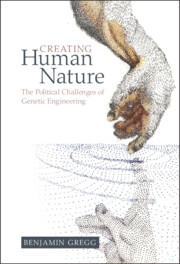Book contents
- Creating Human Nature
- Creating Human Nature
- Copyright page
- Dedication
- Contents
- Acknowledgments
- Introduction
- Part I The Political Bioethics of Regulating Genetic Engineering
- 1 Regulation Guided by Proceduralism
- 2 Regulation Guided by Less-than-Universal Standards
- 3 Regulation Guided by Human Nature as Construction, Not Essence
- 4 Regulation Guided by Human Dignity as Decisional Autonomy, Not Essence
- Part II The Political Dimensions of Engineering Intelligence
- Part III Inequality as an Unintended Consequence Locally and as a Planetary Phenomenon
- References
- Index
4 - Regulation Guided by Human Dignity as Decisional Autonomy, Not Essence
from Part I - The Political Bioethics of Regulating Genetic Engineering
Published online by Cambridge University Press: 13 October 2022
- Creating Human Nature
- Creating Human Nature
- Copyright page
- Dedication
- Contents
- Acknowledgments
- Introduction
- Part I The Political Bioethics of Regulating Genetic Engineering
- 1 Regulation Guided by Proceduralism
- 2 Regulation Guided by Less-than-Universal Standards
- 3 Regulation Guided by Human Nature as Construction, Not Essence
- 4 Regulation Guided by Human Dignity as Decisional Autonomy, Not Essence
- Part II The Political Dimensions of Engineering Intelligence
- Part III Inequality as an Unintended Consequence Locally and as a Planetary Phenomenon
- References
- Index
Summary
We humans have bodies in a biological sense. By contrast, we are our bodies in the cultural context of how, normatively, we collectively regard our own bodies and the bodies of others. The biological is given; the cultural, socially constructed. With the rapidly increasing capacity to manipulate future bodies genetically, toward influencing some traits of future bodies, the distinction between nature and culture weakens but hardly vanishes. To be sure, the sphere of human nature has always shared a porous boundary with human culture. Consider several examples of how humans construct culture. Disease, pathology, and medicine have more to do with nature than culture – but they are not culture-free. Another example: “human nature” with respect to what is “normal,” what is “illness,” what is “harm,” and what constitutes a physical disease or cognitive illness, involves elements both natural and cultural. A third example: notions of human freedom, equality, and rights have mostly to do with culture – but they are not nature-free.
- Type
- Chapter
- Information
- Creating Human NatureThe Political Challenges of Genetic Engineering, pp. 77 - 100Publisher: Cambridge University PressPrint publication year: 2022



